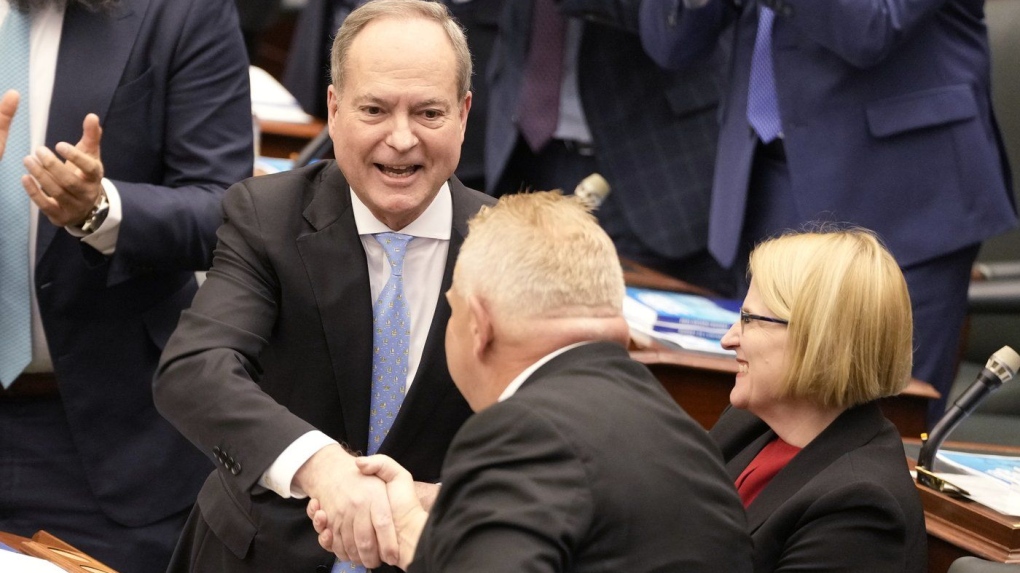Who in the GTA has met their Ontario housing targets? Here’s what happened at Queen’s Park this week
Ontario Premier Doug Ford has been on a big cheque tour, dolling out millions to cities that have met their provincially-set housing targets.
The latest to acquire funding is Milton, Ont., who was handed a little over $8 million for exceeding expectations by adding 1,952 housing starts.
A housing start marks the beginning of construction on a building.
According to provincial data, Ontario has nearly reached its 2023 target of building 110,000 new homes.
This includes 89,297 market housing starts, 9,879 residential units and 9,835 long-term care beds.
But where does the rest of the Greater Toronto Area stand?
Toronto has already received $114 million in funding for breaking ground on 31,656 new housing units last year.
Brampton received $25 million for being “on track” towards meeting its goals, with just over 7,000 housing starts.
Mississauga, meanwhile, is not eligible for funding and will be losing out on about $30 million because the city have only reached 39 per cent of its targets.
- Barrie has exceeded expectations with 1,714 housing starts
- Kitchener has exceeded expectations with 3,579 housing starts
- Newmarket remains at 33 per cent of its 2023 target
- Richmond Hill has reached 39 per cent of its 2023 target
- Vaughan has reached 60 per cent of its 2023 target
- Oshawa has reached 67 per cent of its 2023 target
- Hamilton has exceeded it’s target with 4,142 housing starts
A full breakdown can be found on the government website. Expect the premier, as well as the housing minister, to continue to make funding announcements over the next few weeks.
Here’s what else happened at Queen’s Park this week:
Should long-term care beds count as homes?
Ontario is counting newly created long-term care beds as a home as it works towards building 1.5 million housing units.
Speaking to reporters on Friday, the premier challenged those critical of use of long-term care beds in the housing tally.
“When a senior living in a condo moves out to long-term care, it’s called a home,” Ford told reporters. “They have their own room. They eat in a dining room with everyone else.”
“I challenge anyone to go in and talk to these seniors and say, hey, you got a bed.”
Ontario to ban NOSIs
The Ontario government will introduce legislation in the spring to ban a type of lien that is placed on property in exchange for certain household appliances.
The goal of the legislation is to prevent scams in which Notice of Security Interests (NOSI) are applied without a homeowner’s knowledge when they purchase or rent HVAC appliances such as furnaces or air conditioners. It will also remove all existing NOSIs from the Land Registry.
Budget coming on March 26
Ontario’s finance minister said he will present the 2024 budget at the end of the month.
Few details have been released about what will be in the budget, but the minister said it would “continue on the track to rebuild the economy.”
 Ontario ended the last fiscal year with a smaller deficit than projected in the 2022 budget, largely on the strength of higher tax revenues due to economic growth and inflation. Finance Minister Peter Bethlenfalvy, shown in this March 23, 2023 file photo, and Treasury Board President Caroline Mulroney released the province’s public accounts for 2022-23, which looks at the final numbers for the last fiscal year. THE CANADIAN PRESS/Frank Gunn
Ontario ended the last fiscal year with a smaller deficit than projected in the 2022 budget, largely on the strength of higher tax revenues due to economic growth and inflation. Finance Minister Peter Bethlenfalvy, shown in this March 23, 2023 file photo, and Treasury Board President Caroline Mulroney released the province’s public accounts for 2022-23, which looks at the final numbers for the last fiscal year. THE CANADIAN PRESS/Frank Gunn
The minister also said there will be no tax increases or added fees for consumers.
Deal with all teacher’s unions
The Ontario government came to an agreement with the Ontario English Catholic Teachers’ Association (OECTA).
This is the fourth and final deal the ministry has come to with teachers’ unions. The specific details of the agreement will remain confidential pending ratification by OECTA members, which they say will happen on March 26 and March 27.
However, the minister of education hinted that some issues in the collective agreement have gone to binding arbitration—when a third-party is brought in to make the final decision on any unresolved points of contention. One of those issues will be salary.
Was the government trying to ‘silence’ women?
A day before International Women’s Day a group of independent Members of Provincial Parliament accused the Ford government of trying to silence them.
They had repeatedly asked for additional speaking time to address International Women’s Day and were denied.
After a news conference, in which they bashed the Ford government for refusing their request, the Progressive Conservatives finally relented.
When asked why they voted against the request, Government House Leader Paul Calandra said that he always votes no if he isn’t aware of a unanimous consent motion being presented in the legislature.
However, the independent members did notify the government house leader’s office days earlier.
Other bills, regulations and conversations
View original article here Source









